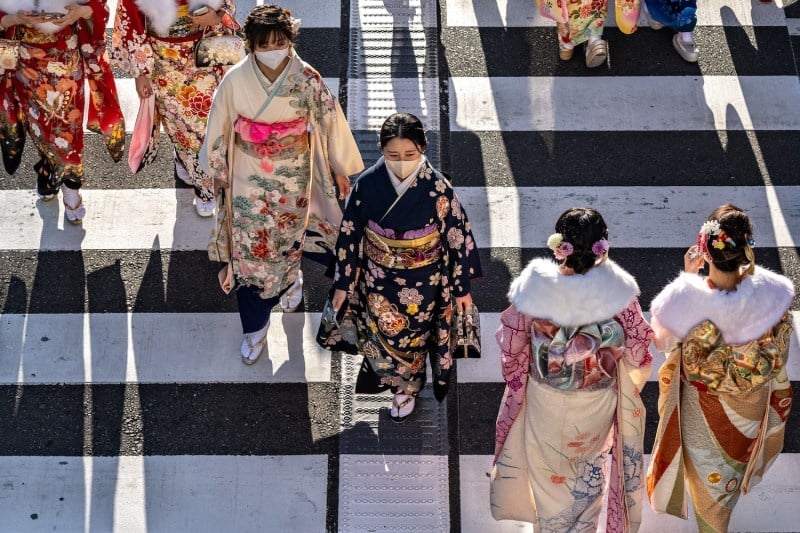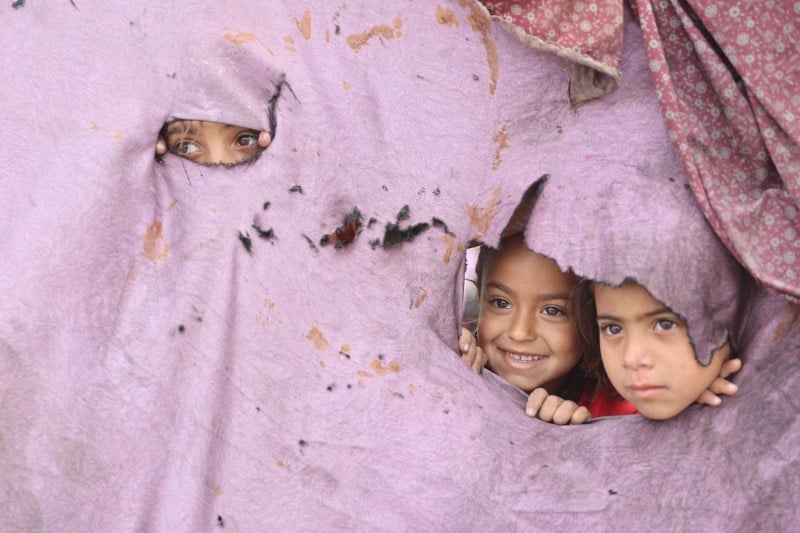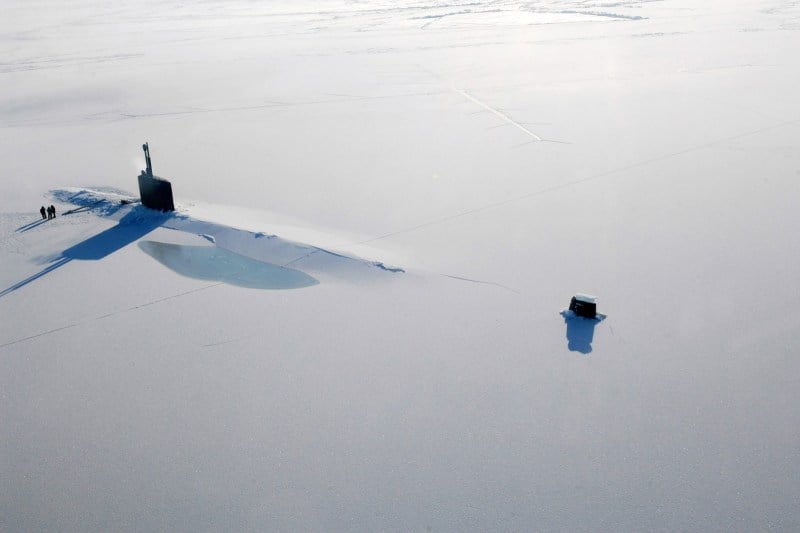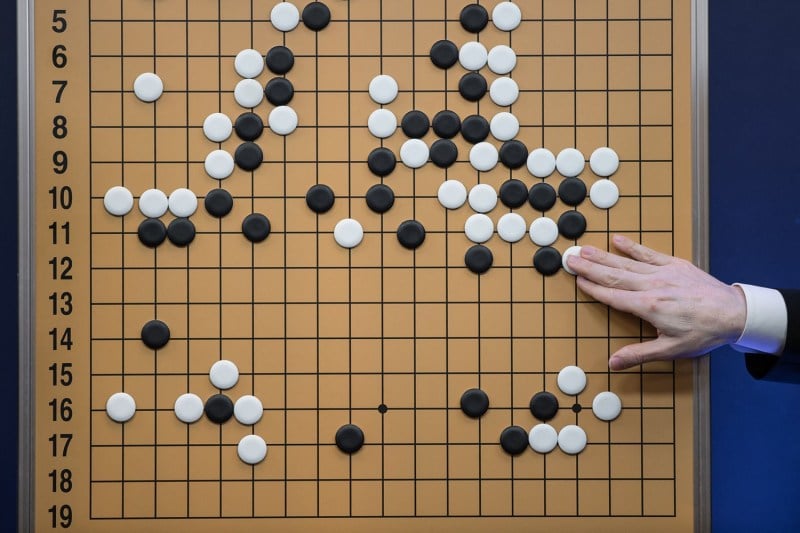Japan’s Support for Women’s Equality Doesn’t Extend to Domestic Reform

Japan’s Support for Women’s Equality Doesn’t Extend to Domestic Reform
Anxieties around imperial succession have exposed the nation’s lack of gender parity.
Young women wear kimonos to mark “Coming of Age Day” to honor people turning 20 in Yokohama, Japan, on Jan. 9, 2023. Philip Fong/AFP via Getty Images
In October 2024, the United Nations’ top gender equality body, the Committee on the Elimination of Discrimination Against Women, published a report urging Japan to amend its imperial succession law. The 1947 Imperial House Law stipulates that only men can become emperor—a principle that was first enshrined in the 1889 Meiji Constitution.
The committee, which monitors states’ compliance with the Convention on the Elimination of All Forms of Discrimination Against Women (CEDAW), regularly issues observation reports following periodic reviews of member states. These reports typically offer recommendations to bring national laws into alignment with CEDAW’s principles of gender equality.
In October 2024, the United Nations’ top gender equality body, the Committee on the Elimination of Discrimination Against Women, published a report urging Japan to amend its imperial succession law. The 1947 Imperial House Law stipulates that only men can become emperor—a principle that was first enshrined in the 1889 Meiji Constitution.
The committee, which monitors states’ compliance with the Convention on the Elimination of All Forms of Discrimination Against Women (CEDAW), regularly issues observation reports following periodic reviews of member states. These reports typically offer recommendations to bring national laws into alignment with CEDAW’s principles of gender equality.
The current, male-only system has caused concerns about the imperial family’s future stability, which have in turn revived discussions within Japan—however tentative—about revising the succession law. As Emperor Naruhito turns 65 this year, the Japanese imperial family has only three heirs: Naruhito’s uncle Prince Hitachi, 89; Crown Prince Fumihito, 59; and his only son, Prince Hisahito, who at 18 is the first male member of the imperial family to reach adulthood in nearly four decades.
In 2024, public opinion polls revealed that 90 percent of respondents supported allowing female emperors. In early 2025, House Speaker Fukushiro Nukaga expressed his wish to finalize measures to address the issue of the shrinking imperial family during the current parliamentary session ending in June. However, conservative factions within Japan’s political establishment remain firmly opposed to giving women the right to rule, citing a so-called “eternal and unbroken” imperial lineage that has existed for thousands of years. Ministry of Foreign Affairs spokesperson Toshihiro Kitamura said imperial throne eligibility is not considered a basic human right, so male-only succession does not violate women’s fundamental rights. Some nationalist and conservative newspapers even lashed out at the CEDAW committee, calling it “ignorant” and accusing it of meddling in Japan’s affairs.
The committee’s recommendation on inclusive succession is neither legally binding nor, as the committee itself acknowledges, within the scope of its formal mandate. A similar CEDAW proposal was considered in 2016 but later removed under pressure from Japan. But this time, the government’s reaction was more antagonistic. On Jan. 27, Japan announced that it would freeze voluntary funding to the committee, a move interpreted as a rebuke to its perceived interference. Japan subsequently canceled the committee’s planned visit to Japan.
According to Japan’s Ministry of Foreign Affairs, Japan has been making annual contributions of approximately 20 million to 30 million yen (about $140,000 to $200,000) to the U.N. Office of the High Commissioner for Human Rights (OHCHR), which manages administrative affairs for CEDAW. While the ministry confirmed that none of these contributions have been used for CEDAW activities since 2005, the funding cut entailed a formal notification to OHCHR that Japan’s contributions must not be allocated to the CEDAW committee. As Kitamura stated, “Ensuring that not even a portion of Japan’s contributions is used for the committee will clarify the government’s position.”
Japan remains the only country in the world that forces married couples to share the same surname, despite public pushback. Likewise, the government has failed to fully criminalize all forms of discrimination and harassment. Reflecting this dismissive attitude, then-Finance Minister Taro Aso, who appeared to defend Junichi Fukuda, a Japanese vice finance minister accused of sexually harassing a female reporter, stated in 2018 that there is “no such thing [crime] as a sexual harassment charge.” In this broader context, the CEDAW committee made a recommendation in 2016 urging Japan to “adopt legal provisions that prohibit and provide for appropriate sanctions to deter sexual harassment at the workplace.” The funding cut reflects broader patterns and contradictions within Japan’s conservative political establishment: While Japan strategically engages with international gender equality agendas to enhance its global soft power, it avoids meaningful domestic reform.
In 2013, then-Prime Minister Shinzo Abe adopted the term “Womenomics”—originally coined by Goldman Sachs strategist Kathy Matsui in 1999—not only as a core pillar of his economic revitalization strategy, “Abenomics,” but also as a rhetorical tool to promote women’s empowerment and enhance Japan’s image. The policy aimed to boost women’s participation in the workforce in response to demographic decline and an aging population. Specifically, it set targets to increase employment rates for women ages 25-44 from 68 percent in 2012 to 73 percent in 2020 while increasing the share of women in leadership roles to 30 percent. It ultimately fell far short of these goals.
However, more than a domestic economic measure, Womenomics became a diplomatic tool and part of Japan’s broader “Women Shine” foreign-policy strategy, itself shortened from the slogan “A society in which women shine.” His effort was in part to counter criticisms, from the European Union to the United States, over Japan’s handling of wartime sexual slavery, as well as Japan’s chronically low rankings on international gender equality indexes.
This international posture was underscored in Abe’s address to the U.N. General Assembly in September 2013, in which he said that “Japan respects the activities of U.N. Women and intends to become one of its leading contributors and thus an exemplary country in the area.” His speech framed gender equality as a domestic priority and a shared international responsibility.
Internationally, this gender equality discourse gained traction. In addition to the money allocated to OHCHR, Japan pledged more than $3 billion in official development assistance for global initiatives supporting women’s education and leadership. It further aligned itself with U.N. Women’s core commitment to gender equality through donations and support for a range of programs such as the World Assembly for Women and Empowered Women, Peaceful Communities and endorsed the women, peace, and security agenda.
Despite its global advocacy, Japan’s domestic policies on gender equality have continued to lag. Japan ranked 118 out of 146 countries in the 2024 Global Gender Gap Index (GGGI), primarily due to ongoing barriers to women’s participation in the political and economic spheres. Outdated views that favor men in politics and the workplace contributed to it placing at the bottom among the G-7 nations. It also lagged behind several Asian countries, with China at 106 and South Korea at 94. While the female employment rate has risen, structural barriers continue to stymie women from attaining management roles. These include a reliance on part-time positions, inadequate corporate support for women’s career development, limited government influence on corporate practices, and a lack of diversity in executive and governance structures. Japan ranks 27 out of 29 among Organization for Economic Cooperation and Development countries in the Economist’s 2025 glass-ceiling index, having moved up only one place since 2016. In politics, although there are a few high-profile female figures, a systemic glass ceiling blocks women from reaching the highest levels of political leadership.
In 2016, while still in office, the Abe administration revised its ambitious national target of filling 30 percent of senior positions with women by 2020, lowering the goals to 7 percent for senior government roles and 15 percent in the corporate sector. This shift marked a decline in the prioritization of Abe’s “Women Shine” foreign policy.
The CEDAW funding halt reveals the limit to Japan’s gender equality advocacy. While the nation has been eager to promote women’s empowerment on the global stage through verbal and monetary support, it remains resistant to international scrutiny and recommendations that challenge its domestic status quo and reluctant to adopt binding international accountability mechanisms. There were earlier signs that Japan’s gender equality policy was largely lip service, as well.
Japan ratified CEDAW in 1985, thereby committing to promote gender equality and eliminate discrimination against women. However, it has yet to ratify the Optional Protocol adopted in 1999, which enables individuals to file complaints with the CEDAW committee and allows inquiries into serious or systemic violations. This remains the case despite more than half a million petition signatures and support from hundreds of local assemblies. Given that the ruling Liberal Democratic Party—with its socially conservative agenda—has governed Japan almost without interruption for seven decades, it’s unsurprising that this leadership continues to resist ratifying the Optional Protocol.
In contrast, a majority of countries—115 out of the 189 parties to CEDAW—have either signed and ratified or acceded to the Optional Protocol, including Morocco, which acceded most recently in 2022 despite ranking in the bottom 10 of the 2024 GGGI. This places Japan among the minority of states, such as Iraq, that have nominally committed to CEDAW without adopting its more robust monitoring mechanisms.
Japan’s funding withdrawal may embolden domestic conservative groups that resist progressive gender reforms and international scrutiny. Some are even saying that the committee’s recommendations justify withdrawing from CEDAW altogether. One of the most influential among these is Nippon Kaigi, a powerful, ultra-right nationalist lobby group closely tied to the political elite, including a third of Japan’s parliament and more than half of the Abe’s 2015 cabinet. With a revisionist agenda—glorifying Japan’s wartime past as the “liberation” of East Asia from Western colonialism, rebuilding the military, and restoring prewar reverence for the emperor—such groups view progressive reforms as external impositions on national sovereignty. More concerning is the deployment of financial pressure to influence an international body, raising serious questions about Japan’s credibility on global gender justice and human rights standards. And Prime Minister Shigeru Ishiba’s administration has been criticized for attaching “a low priority to gender-equality policies,” as reflected in its overwhelmingly male cabinet.
As the Chrysanthemum Throne’s future rests on Hisahito, Japan must reconcile its deeply conservative politics with the liberal gender norms it claims to uphold. To meet that challenge, Japan must adopt a more consistent and comprehensive approach to gender equality—one that bridges the gap between its international rhetoric and domestic realities. This includes dismantling structural barriers to women’s advancement, confronting historical injustices such as the sexual violence committed against women by the imperial Japanese army, and challenging cultural norms that continue to entrench gendered hierarchies. Reengaging constructively with international bodies such as the CEDAW committee, rather than retreating from them, would demonstrate commitment and reaffirm Japan’s aspiration to become an “exemplary country” in gender equality and diplomacy. Without such resolve, Japan’s international standing on gender justice risks being irretrievably undermined.
Ming Gao is a researcher of East Asian studies in Lund University’s history department. He has written extensively on contemporary and historical issues related to Japan, South Korea, and China.
More from Foreign Policy
-

Eight people dressed in camouflage military combat uniforms wade across a river, the water up to their waists. The soldiers carry large backpacks along with their rifles. Snowcapped mountains and a thick forest of evergreen trees loom in the distance. Get Ready for the Aleutian Island Crisis
As conflict heats up in the Arctic, foreign adversaries eye Alaskan territory.
-

U.S. President Donald Trump speaks to reporters before boarding Air Force One at Morristown Municipal Airport in Morristown, New Jersey, on April 27. Trump’s First 100 Days Reveal a ‘Strongman’s’ Unprecedented Weakness
No U.S. president has ever surrendered global power so quickly.
-

An elderly man and woman sit on the ground, the man on his knees as he sorts through something on the ground. Behind him are a rusted cart and bicycle in front of a paint-smeared concrete wall and a battered corrugated metal sign with the words USAID: From the American people” on it. What Trump’s New Budget Says About U.S. Foreign Policy
The president wants to significantly pull back on many of America’s traditional global engagements while spending more on the border and defense.
-

U.S. President Donald Trump listens to Secretary of State Marco Rubio at a cabinet meeting in the White House in Washington, D.C. Rubio’s Reorganization Plan Is a Wrecking Ball
The State Department revamp goes far beyond streamlining—it will devalue human rights and strip away critical expertise.









Join the Conversation
Commenting on this and other recent articles is just one benefit of a Foreign Policy subscription.
Already a subscriber?
.
Subscribe
Subscribe
View Comments
Join the Conversation
Join the conversation on this and other recent Foreign Policy articles when you subscribe now.
Subscribe
Subscribe
Not your account?
View Comments
Join the Conversation
Please follow our comment guidelines, stay on topic, and be civil, courteous, and respectful of others’ beliefs.
Change your username |
Log out
Change your username:
CANCEL
Confirm your username to get started.
The default username below has been generated using the first name and last initial on your FP subscriber account. Usernames may be updated at any time and must not contain inappropriate or offensive language.